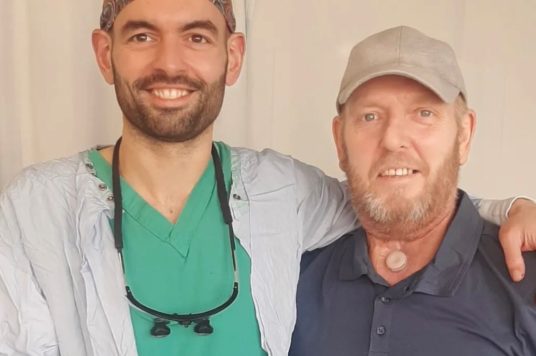Cancer patient commends St George’s for ‘kindness, compassion and understanding’ post-surgery
John Organ was diagnosed with laryngeal cancer in November 2022. He was operated on by a specialist team at St George’s just seven weeks later, and successfully had his cancer removed.
From diagnosis right through to the operation, John was so grateful for his care. Ahead of World Cancer Day on 4 February, he shared a special account of his time at St George’s to thank everyone involved:
“My cancer journey started on wed 16th November 2022.
“I met Consultant ENT surgeon Arun Takhar who first diagnosed me using a scope. Soon after I visited St George’s and a biopsy was taken.
“St Georges was a new hospital to me, and I have never been treated there before. This was the most scared and vulnerable time in my life and yet I was made to feel at ease. From the surgical team to the day surgery nurses I was treated so kindly.
“A date was set for surgery of total laryngectomy, 50% thyroid gland, and around 40 neck lymph nodes to be removed. 9th January was the date and my anxiety kicked in again. Once again everybody that I met at St George’s made me feel so confident and in such good hands that my anxiety disappeared.
“Once the surgery was over, I was in the intensive care unit for 3 days and again the care that I received from everyone there was second to none, I was so well looked after. Nurse Kate helped me to get my confidence back and come to terms with my future. Wonderful staff and human kindness were here in abundance.
“Once well enough, I was moved to Florence nightingale ward. Wow just wow what a ward. Filled with such wonderful caring people who treated me with such kindness and dignity. The nurses sat with me during the dark hard days and laughed with me during my brighter days. Without them, I would still be in bed.
“From the consultants to the lady that made me tea from the radiologists to dieticians. I was treated with such kindness, compassion, and understanding. I cannot thank you all enough. I truly owe my life to all at St George’s. Thank you.”
Arunjit Takhar, Consultant ENT surgeon at St George’s diagnosed John and operated on him. He said:
“John was diagnosed with advanced laryngeal cancer and his only curative treatment option was to undergo major surgery by way of laryngectomy (removal of the voice box) which is a life changing procedure, not least due to the impact upon breathing, communication, and swallowing.
“As a multi-disciplinary head and neck team we work hard, counsel patients and support them through the process; however, it can still be challenging for patients to be fully prepared for such a major undertaking. John’s cancer story is an invaluable insight into the patient journey that will be a major help for other patients having to undergo the same experience.
“It is really great to receive such positive feedback for the care he received and is testament to the hard work and dedication of our Head and Neck Team, GICU, Theatres and Florence Nightingale Ward!”
Jessica Provstgaard Morys is a Speech and Language Therapist for St George’s Florence Nightingale ward, an ear, nose and throat specialist ward. She worked with John to regain his confidence and voice using his new Electrolarynx. She shared:
“Following John’s life-changing surgery he had to learn to swallow and communicate again and manage his new way of breathing.
“He showed incredible resilience and positivity during his time with us and we are all very proud of him.
“Through sharing his recovery via social media, he is raising awareness about the effects of head and neck cancer treatment which will be invaluable for other patients going through a similar experience and the clinicians supporting them. We wish him luck in the next step of his treatment and look forward to working with him again!”
Notes
Laryngeal cancer is type of cancer that affects the larynx (voice box).
You should see a GP if you have had a hoarse voice for more than 3 weeks, as this is the main symptom of laryngeal cancer.
Other symptoms include:
- a change in your voice, such as sounding hoarse
- pain when swallowing or difficulty swallowing
- a lump or swelling in your neck
- a long-lasting cough or breathlessness
- a persistent sore throat or earache
- a high-pitched wheezing noise when you breathe
- in severe cases, difficulty breathing
- Some people may also experience bad breath, unintentional weight loss, or fatigue (extreme tiredness).
For more information on laryngeal cancer, visit the NHS website.


